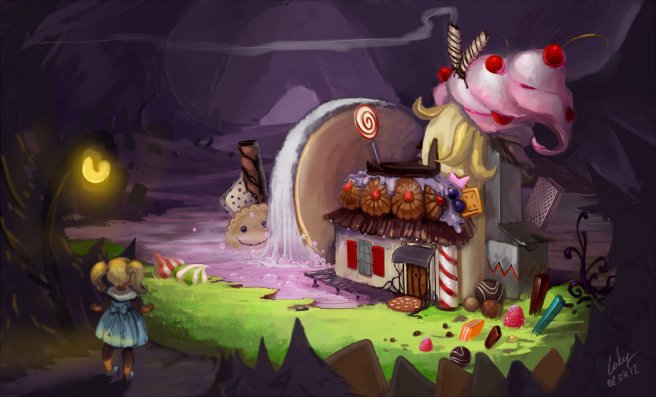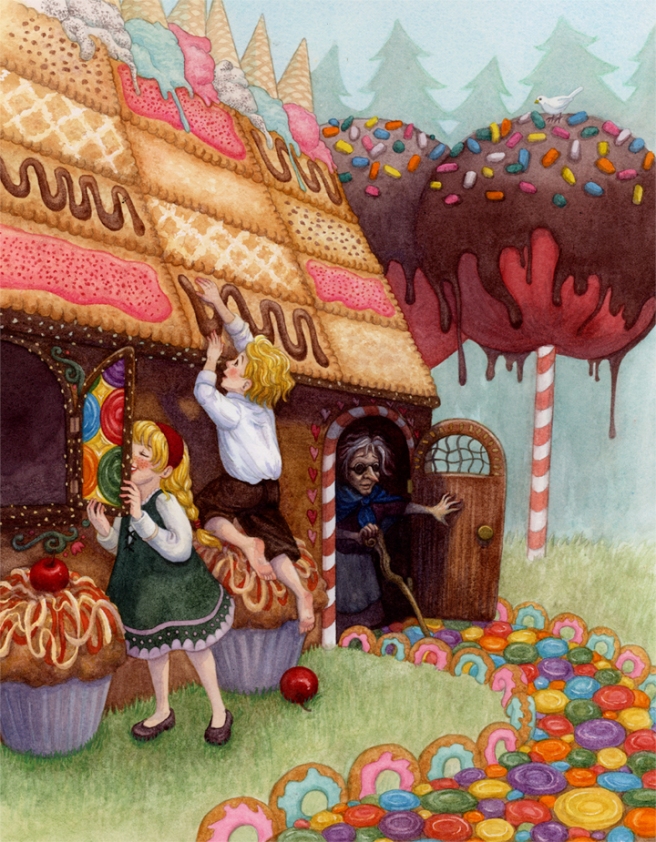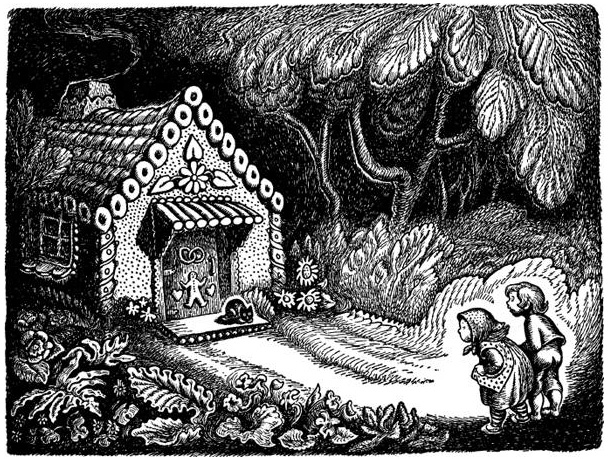Trespassing. Stealing. Lying. Killing.
All of these are acts commonly frowned upon and usually punished in our society. These are also all acts committed by Hansel and Gretel in most popular versions of the classic fairy tale. One may argue that they did these things to protect themselves; however, only one of these acts was performed after they discovered the witch’s evil intentions. The stealing, lying, and trespassing all occurred before said discovery, and still, many would say that there is never a good excuse to kill another.
 So, what exactly did Hansel and Gretel do that was so terrible, and why is this aspect of the story often overlooked?
So, what exactly did Hansel and Gretel do that was so terrible, and why is this aspect of the story often overlooked?
To further explore this idea, it is first important to consider what exactly these purported acts of Hansel and Gretel entailed:
1. Trespassing – Hansel and Gretel trespassed onto the private property of the “old woman” without permission, even seeing the house and most likely realizing that someone owned it.
2. Stealing – There is no other way to interpret what the children were doing when they ate the pieces of the gingerbread house. They were taking what wasn’t theirs, plain and simple.
3. Lying – When the house’s occupant realized someone was outside she said, “Nibble, nibble, little mouse, who is nibbling at my house?” to which the children replied, “The wind, the wind, the heavenly child.” This is an obvious lie, and at that point in the story, the children didn’t know the occupant was a witch, giving them no good reason to not tell the truth.
4. Killing – This one is pretty straight forward; Hansel tricked the witch and pushed her into the oven, effectively burning her to death. Even though the witch was planning on doing something similar to the children, that doesn’t change the fact that it was murder.
 (These four examples and complementary quotes were taken from the Grimm version of Hansel and Gretel).
(These four examples and complementary quotes were taken from the Grimm version of Hansel and Gretel).
Before taking this seminar on fairy tales, I had never realized how terribly behaved Hansel and Gretel really were. Going over the story with this new perspective has since prompted me to wonder why we, as readers, usually sympathize with Hansel and Gretel and feel bad for them, despite all of their crimes.
Obviously, one possible reason is that they were abandoned in the woods by their stepmother; however, as the saying goes “two wrongs don’t make a right.” The stepmother’s cruelty doesn’t justify trespassing, stealing, lying, or killing. Killing the witch may be overlooked by some as self-defense, which is a fair argument, but even then that leaves three remaining acts still terrible in their own right.
This leads one to ask: what is the real reason these acts are often overlooked?
Although there are several possible reasons, the factor I believe to be the strongest is the fact that they are young children. In our culture today especially, we perceive children as “innocent.” That wasn’t always the case though it may seem like it. Robin Bernstein, a professor at Harvard, states that this idea originated just in the last two hundred years in the United States, making this practice fairly recent in its origins.
Seeing children as innocent causes people to make excuses for their behavior, justifying that the children trespassed and stole food because “they didn’t know any better.” Invalidating these excuses, though, is research on children’s ability to tell right from wrong. One research study shows that children can start making moral judgments from as young as six months. In addition, David Elkind, an expert on child development, states that by seven or eight years old children can also make judgments based on intent. Basically, Hansel and Gretel, who are probably around this age or older, should have been able to differentiate between right and wrong.
 By ignoring Hansel and Gretel’s misconduct or making excuses for them, it is almost as if we are glorifying their acts. In my previous blog post, I concluded that parents shouldn’t be concerned with their children forming unrealistic expectations of becoming a Disney prince/princess, because children are able to differentiate between real and make-believe from a young age. Stories like this, on the other hand, should be giving parents greater cause for concern, because the acts committed by Hansel and Gretel (trespassing, stealing, lying, and killing) are very real and thus can have very real consequences. The two main characters were old enough to know better, and we don’t want to perpetuate the idea that not respecting private property or hurting another person is okay, fairy tale or not.
By ignoring Hansel and Gretel’s misconduct or making excuses for them, it is almost as if we are glorifying their acts. In my previous blog post, I concluded that parents shouldn’t be concerned with their children forming unrealistic expectations of becoming a Disney prince/princess, because children are able to differentiate between real and make-believe from a young age. Stories like this, on the other hand, should be giving parents greater cause for concern, because the acts committed by Hansel and Gretel (trespassing, stealing, lying, and killing) are very real and thus can have very real consequences. The two main characters were old enough to know better, and we don’t want to perpetuate the idea that not respecting private property or hurting another person is okay, fairy tale or not.
Sources (listed in order of use):
- http://www.pitt.edu/~dash/grimm015.html
- http://tvtropes.org/pmwiki/pmwiki.php/Main/ChildrenAreInnocent
- http://news.harvard.edu/gazette/story/2010/04/the-invention-of-childhood-innocence/
- http://phys.org/news/2010-05-psychologists-babies-wrong-months.html
- http://www.qcc.cuny.edu/SocialSciences/ppecorino/INTRO_TEXT/Chapter%208%20Ethics/Learning-Right-From-Wrong.htm
- https://fairytale2016.wordpress.com/2016/01/28/fairy-tales-and-high-expectations/
Images (listed in order of use):
